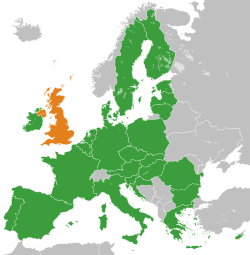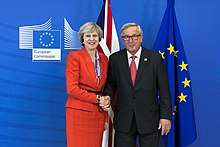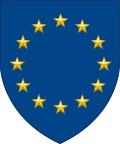European Union–United Kingdom relations
Relations between the European Union (EU) and the United Kingdom of Great Britain and Northern Ireland (UK) date back to the foundation of the European Communities, the European Union's predecessor, in 1957. The United Kingdom was a major member state of the European Communities after joining it in 1973. It was a leading member state of the European Union until it became the first country to voluntarily end its membership on 31 January 2020 after a referendum was held in 2016 which resulted in 51.9% of voters opting to leave. The Brexit withdrawal agreement now plays a significant role in relations between the two entities, especially during the transition period which lasts until 31 December 2020. United Kingdom borders one EU member state: Ireland.
 | |
EU |
United Kingdom |
|---|---|
| Diplomatic mission | |
| European Union Delegation, London | United Kingdom Mission, Brussels |
| Envoy | |
| Ambassador João Vale de Almeida | Ambassador Tim Barrow |
History

The United Kingdom's applications to join in 1963 and 1967 were vetoed by the President of France, Charles de Gaulle, who said that "a number of aspects of Britain's economy, from working practices to agriculture" had "made Britain incompatible with Europe" and that Britain harboured a "deep-seated hostility" to any pan-European project.[1] Once de Gaulle had relinquished the French presidency in 1969, the UK made a third and successful application for membership.
Since 1977, both pro- and anti-European views have had majority support at different times, with some dramatic swings between the two camps.[2] In the United Kingdom European Communities membership referendum of 1975, two-thirds of British voters favoured continued EC membership. The highest-ever rejection of membership was in 1980, the first full year of Prime Minister Margaret Thatcher's term of office, with 65% opposed to and 26% in favour of membership.[2] Although the United Kingdom had been a member of the European Union, they never adopted the use of the euro or adhered to the Schengen agreements. The Schengen agreements allowed citizens of countries in the European Union to travel without border controls.[3]
Following the result of the 2016 United Kingdom European Union membership referendum, when 52 percent of those who voted supported Brexit, the UK negotiated its withdrawal from the European Union. After the vote, British Prime Minister David Cameron, who supported staying in the E.U., resigned. Theresa May became the Prime Minister after his formal resignation. Although she also supported remaining in the E.U., she promised to negotiate Britain's exit.[4] They formally left the bloc on 31 January 2020.
Comparison
| Population | 447,206,135[5] | 67,545,000 |
| Area | 4,324,782 km2 (1,669,808 sq mi)[6] | 244,820 km2 (94,526 sq mi) |
| Population Density | 115/km² (300/sq mi) | 271/km2 (677/sq mi) |
| Capital | Brussels (de facto) | London |
| Global Cities | Paris, Rome, Berlin, Vienna, Madrid, Amsterdam, Athens, Dublin, Helsinki, Warsaw, Lisbon, Stockholm, Copenhagen, Praha, Bucharest, Nicosia, Budapest, Sofia | London, Manchester, Birmingham,Glasgow, Belfast, Cardiff |
| Government | Supranational parliamentary democracy based on the European treaties[7] | Unitary parliamentary constitutional monarchy |
| First Leader | High Authority President Jean Monnet | King George III |
| Current Leader | Council President Charles Michel Commission President Ursula von der Leyen |
Queen Elizabeth II Prime Minister Boris Johnson |
| Official languages | 24 official languages, of which 3 considered "procedural" (English, French and German)[8] | English |
| Main Religions | 72% Christianity (48% Roman Catholicism, 12% Protestantism, 8% Eastern Orthodoxy, 4% Other Christianity), 23% non-Religious, 3% Other, 2% Islam |
59.5% Christianity, 25.7% non-religious, 7.2% unstated, 4.4% Islam, 1.3% Hinduism, 0.7% Sikhism, 0.4% Judaism, 0.4% Buddhism |
| Ethnic groups | Germans (ca. 80 million), French (ca. 67 million), Italians (ca. 60 million), Spanish (ca. 47 million), Poles (ca. 46 million), Romanians (ca. 16 million), Dutch (ca. 13 million), Greeks (ca. 11 million), Portuguese (ca. 11 million), and others |
87.2% White (81.9% White British), 6.9% Asian, 3% Black, 2% Mixed, 0.9% Other (2011 Census) |
| GDP (nominal) | $16.477 trillion, $31,801 per capita | £2.021 trillion (US$2.62 trillion), £30,600 per capita ($39,670) |
Trade
In 2017, exports to the European Union amounted to £274 billion out of £616 billion in total exports for the UK. The proportion of UK export to the EU has been noted to be in decline, since exports to non-EU countries have increased at a faster rate.[9]
United Kingdom's foreign relations with EU member states (EU27)
Diplomatic relations between UK and EU member states
See also
- Foreign relations of the United Kingdom
- Foreign relations of the European Union
- Post-Brexit United Kingdom relations with the European Union
- Germany–United Kingdom relations
- France–United Kingdom relations
- Italy–United Kingdom relations
- Spain–United Kingdom relations
- Netherlands–United Kingdom relations
- Ireland–United Kingdom relations
- Gibraltar–Spain border
- Cyprus dispute
- Ireland–United Kingdom border
- Greece–United Kingdom relations
- Cyprus–United Kingdom relations
- Ireland–NATO relations
- European Union–NATO relations
References
- "1967: De Gaulle says 'non' to Britain – again". BBC News. 27 November 1976. Retrieved 9 March 2016.
- Mortimore, Roger. "Polling history: 40 years of British views on 'in or out' of Europe". The Conversation. Retrieved 25 October 2016.
- "It's Complicated: From the Roman Empire to Brexit, Britain Has Always Struggled to Define Its Relationship With Europe". Time. Retrieved 2020-03-04.
- "United Kingdom - The "Brexit" referendum". Encyclopedia Britannica. Retrieved 2020-03-04.
- "Population on 1 January". Eurostat. European Commission. Retrieved 9 March 2015.
- "Field Listing – Area". The World Factbook. Central Intelligence Agency. Retrieved 9 March 2015.
- "Archived copy". Archived from the original on January 21, 2015. Retrieved 2015-01-21.CS1 maint: archived copy as title (link)
- "European Commission - PRESS RELEASES - Press release - Frequently asked questions on languages in Europe". europa.eu. Retrieved 2017-06-24.
- "Everything you might want to know about the UK's trade with the EU". 28 August 2018. Retrieved 7 December 2018.

